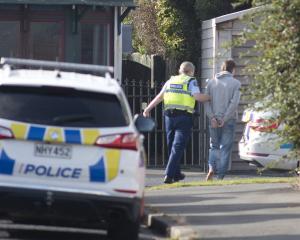
Museum visitor experience manager Kirsty Glengarry said many ship passengers had been moved by their encounter with Otago Settlers Association members and other volunteers knitting and crocheting poppies at the museum.
Another cultural group, Images of the Past, is also taking part.
One ship passenger, a Brisbane woman, had bought wool from a nearby store, had taken a free pattern available from the museum, and planned to knit poppies on her cruise around New Zealand, and to send them back to the museum, museum officials said.
The poppy knitting started on January 1, and will continue each Wednesday and Thursday this month, from 10am to 2pm.
Volunteers will continue knitting and it was planned to have at least 240 completed by Anzac Day, representing the number of Dunedin people who died in military service during the Gallipoli campaign, Ms Glengarry said.
It was ultimately planned to knit about 1840 poppies, reflecting the number of Dunedin people who died on military service during World War 1, she said.
Poppies would be displayed on a wall at ''Call to Arms'', the museum's permanent military exhibition area, and would be in place by Anzac Day, to mark the 100th anniversary of the landing at Gallipoli.
The poppies will also be exhibited throughout the remainder of the World War 1 commemorative period, ending in 2018.
Carole Pike, an Otago Settlers Association committee member, said it had been ''quite exciting'' to take part in the knitting yesterday.
She felt ''quite emotional'' about the project, and said there had been a tendency earlier for some of the sacrifices of World War 1 participants to be forgotten.












